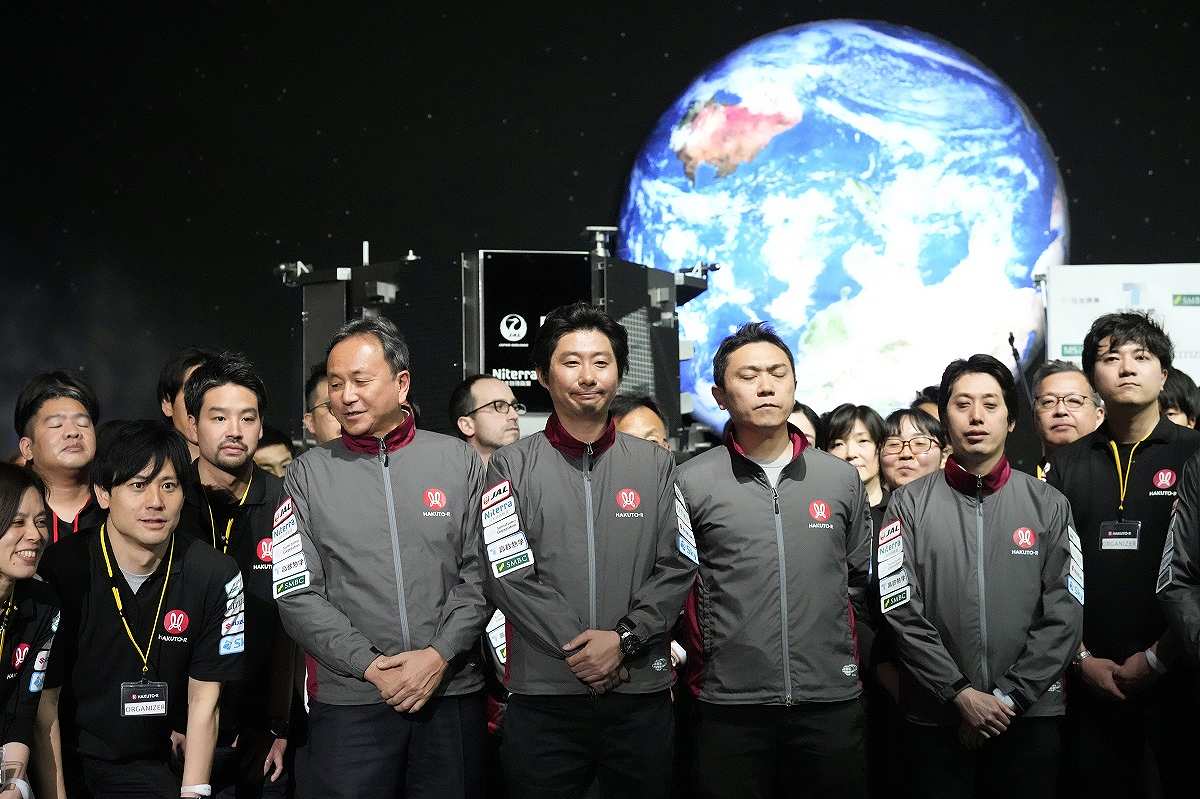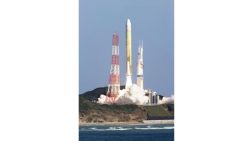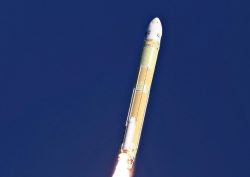
Takeshi Hakamada, center, founder and CEO of ispace, and his team staff gather for photo session after livestream of HAKUTO-R private lunar exploration program on screen at the lunar landing event at Miraikan, the National Museum of Emerging Science and Innovation, in Tokyo on Wednesday.
18:05 JST, April 26, 2023
TOKYO (Jiji Press) — An attempt by Tokyo-based space exploration startup ispace Inc. to achieve the world’s first private-sector lunar landing ended in failure Wednesday.
The company said that its lunar lander, which was launched in December last year by the Falcon 9 rocket of U.S. spacecraft manufacturer SpaceX, attempted to land on the moon in the small hours of Wednesday Japan time and that communication with it was lost soon after that.
The lander is highly likely to have crashed against the moon’s surface, ispace said.
“We were able to obtain data until just before the landing, and that was a very significant achievement, a major step toward the next stage,” ispace CEO Takeshi Hakamada told a press conference, showing a drive for a successor lander’s launch planned in 2024 or later.
According to the company, the lunar lander, which was going around the moon at an altitude of about 100 kilometers, began to descend around 12:40 a.m. Wednesday (3:40 p.m. Tuesday GMT). After spending about an hour to slow down, the probe vehicle was scheduled to land near the Atlas crater in an area known as Mare Frigoris, or Sea of Cold, around 1:40 a.m. the same day.
The spacecraft was operating normally until it started the final thrust at an altitude of approximately 20 kilometers some 20 minutes before the planned landing time.
Top Articles in Science & Nature
-

Japan Institute to Use Domestic Commercial Optical Lattice Clock to Set Japan Standard Time
-

Space Mission Demonstrates Importance of International Cooperation, Astronaut Kimiya Yui Says
-

Japan to Face Shortfall of 3.39 Million Workers in AI, Robotics in 2040; Clerical Workers Seen to Be in Surplus
-

Record 700 Startups to Gather at SusHi Tech Tokyo in April; Event Will Center on Themes Like Artificial Intelligence and Robotics
JN ACCESS RANKING
-

Japan Institute to Use Domestic Commercial Optical Lattice Clock to Set Japan Standard Time
-

Israeli Ambassador to Japan Speaks about Japan’s Role in the Reconstruction of Gaza
-

Man Infected with Measles May Have Come in Contact with Many People in Tokyo, Went to Store, Restaurant Around When Symptoms Emerged
-

Prudential Life Insurance Plans to Fully Compensate for Damages Caused by Fraudulent Actions Without Waiting for Third-Party Committee Review
-

Woman with Measles Visited Hospital in Tokyo Multiple Times Before Being Diagnosed with Disease
























